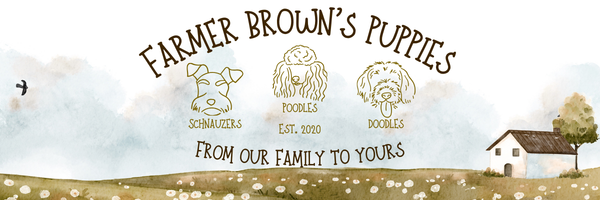Helpful Puppy Hints and Advice
The time has finally arrived: after weeks of watching your puppy grow from a distance, it's finally time to bring him home! Here's what you need to know to help settle him in!
FOOD: We feed Purina Pro Plan Puppy Under 1 Year, Shredded Chicken and Rice Formula and a sample will be sent home with you. It is available at Tractor Supply, PetSmart, Menards, amazon.com and chewy.com.
We mix the dry food with canned food here as we transition the puppies to eating solid foods. We use Purina Pro Plan Puppy High-Protein Chicken and Brown Rice Entree Pate Wet Dog Food canned food. Often, we are still doing this when it’s time to go home, as we have found it encourages even the pickiest of puppies to eat well and keep their weight gains up. If your puppy is still eating canned food mixed in with the dry, we will send a can home with you so you can continue to encourage good eating as she transitions to her new home. By go home time, we are usually mixing in about 1 Tbsp of wet food per each cup of dry food. The food can be found at Tractor Supply or online at amazon.com and chewy.com. If you decide to wean him off of the canned food, you can moisten his dry food for a bit with some warm water or chicken broth, to encourage him to continue eating well. Gradually reduce the amount of liquid and she should be eating the dry food in no time! Adding in low fat, cooked meat and/or scrambled eggs is another good option to increase their protein intake and encourage eating. Plain yogurt makes for a nice treat occasionally, as well.
You should feed your puppy 2-3 times per day. I will let you know about how much food and how often your puppy is eating when he leave here to go home with you. If you choose to swap your puppy over to a different food, please follow the manufacturer’s recommendations for amounts. To swap over to a new food, you’ll want to slowly replace some of the Purina food with your food of choice, adding a little more of your chosen food each day while reducing the amount of Purina, over the course of a week or so.
Raw veggies, such as carrots or cucumbers not only act as great teether for puppies, but also help add some veggies to their diets! Avoid onions, grapes, and avocadoes.
PUPPY PROOFING: Before you bring your puppy home, you’ll want to make sure you have puppy proofed your home. No small items, especially breakables, down where puppy can reach them. Know where your electrical cords are and make sure puppy can’t get to them. Check to make sure puppy cannot get into any cleaning products or any other toxic things, such as rat poison, etc. Also, supply your puppy with several good chew toys, so that he is less tempted to chew up your shoes or other items!
CRATES: We recommend a 24” snap together, wire kennel crate that has a movable divider for crate training. This works out great because it can grow with your puppy. This not only gives your puppy a safe place at night but also during the day if she is tired or feeling overwhelmed. The crates are small enough to not take up too much space in your home and are very sturdy and durable. You can throw a blanket or small pillow in for your puppy and once he is completely night trained a bigger pillow will fit nicely. We recommend waiting to allow your puppy to sleep with you until she is completely house broken AND trustworthy enough to not go roaming through the house in the middle of the night, wreaking havoc.
HOUSEBREAKING: We have found that if you feed your puppy at set times, usually around your own meal times, this makes housebreaking quicker and easier. As soon as puppy finishes eating, take her out to her designated potty spot and use whatever signal word you have chosen. Encourage him, walking around if necessary. He will follow you around the yard and this will usually help encourage him to go within 5 minutes or so. Also, while housebreaking, do not leave water out all the time-by all means, make sure puppy gets enough, but just as you take her out right after eating, you’ll want to take her out fairly quickly after drinking, to help avoid pee accidents in the house. Once she is housetrained, then water can be left out all of the time.
VET: If you haven’t already, you will want to find a vet for your puppy. He will need to be seen within the first five (5) business days after you bring him home. Puppies will have had both 6 and 8 week shots. Your vet will visit with you about the rest of her puppy shots, but usually the last round is giving at 12 weeks, followed by adult shots, including rabies, around 16 weeks. Your puppy has been wormed with Strongid every week, beginning at 3 weeks of age. You will want to ask your vet about her recommendations for worming as your puppy grows, as well as recommendations for preventing heartworm and flea and tick prevention. We use Frontline on our smaller dogs, and have had good success with Bravecto for our older dogs.
SPAYING AND NEUTERING: Be sure and visit with your vet about when he recommends spaying and neutering. We recommend allowing your female puppy to experience at least one natural heat cycle before spaying, and waiting at least 6 months, if not closer to 1 year, before neutering your male puppy, as there is some evidence that waiting longer is better for your dog’s health and personality. Please research this for yourself and follow your vet’s recommendations.
YOUR PUPPY AND YOUR CHILDREN: While here at Farmer Brown’s Puppies, your puppy has been played with and exposed to children of all ages, so he should be well-socialized. However, you will still want to keep a close eye on small children, especially toddlers, when interreacting with the puppy. The puppy will nip and bite, as this is how they play, but also how they defend themselves, and it would be terrible if this is how your puppy learns to interact with your child! Small children are usually very excited and interested in puppies, which is wonderful, but the puppy will need a break from your child!
XOXO,
Emily & Chris Brown & family

